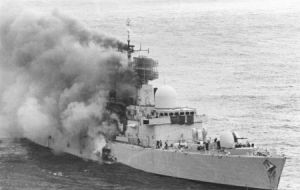MercoPress. South Atlantic News Agency
Falklands’ HMS Sheffield commander died December 3
 HMS Sheffield burning following the hit by an Exocet
HMS Sheffield burning following the hit by an Exocet Rear-Admiral Sam Salt, who died on December 3 aged 69, commanded the first British warship to be sunk by enemy action after the Second World War
On May 4 1982, during the Falklands War, Salt was captain of the Type 42 guided-missile destroyer Sheffield, one of three ships stationed up-threat of the task force to protect the aircraft carriers Hermes and Invincible. In the early afternoon another destroyer, Glasgow, intercepted three radar sweeps from an enemy aircraft.
In Sheffield Salt had been summoned to speak on Satcom (satellite communications radio), the frequency of which interfered with the same radar reception, but at 1359 Glasgow detected two fast-moving radar contacts 25 miles away and broadcast an alarm.
Having briefly gained altitude to view their target by radar, two Argentine Super-Etendards then turned towards Sheffield at sea level and released their Exocet missiles at 1402 from about eight miles. Sheffield's electronic intercept equipment detected an Exocet which was already locked on to her, but at very low level and short range, so her Seadart missile system was unable to engage.
A lookout saw the flash of the missile launch and called “Hit the deck!” but seconds later there was a thud “like a car going over a large stone in the road” as a missile slammed into Sheffield amidships; although it did not explode, its kinetic energy and the unspent fuel created dense smoke and started a fierce fire which quickly raged out of control.
The heat was so intense that the firefighters were scalded by the water from their hoses which boiled as it hit the ship's hot bulkheads. The paint blistered away, giving off nauseous fumes. Despite every effort to save her, by early evening Salt had to order his crew to abandon ship, with 20 dead and 24 injured. Several days later Sheffield sank while under tow. Writing about the event in his biography One Hundred Days, Admiral Sir Sandy Woodward remarked: “We would all have to get seriously sharper if we were to survive.”
The sinking of the “Shiny Sheff” – the first of four Royal Navy vessels to be lost in the course of the conflict – shocked the British nation and put an end to any possible diplomatic solution to the dispute over the Falkland Islands between Britain and Argentina.
James Frederick Thomas George Salt, always known as Sam, was born on April 19 1940, six months before his father was lost in the submarine Triad which sailed from Malta for war patrol in the Gulf of Taranto and was never heard from again.
Modern analysis indicates that she was sunk by on the night of October 14/15 by the Italian submarine Enrico Toti.
Sam was educated at Wellington, entered Dartmouth in 1958 and, after worldwide service in surface ships, followed his father into submarines. After successful command of the diesel-electric Fin Whale from 1969 to 1971, he was selected for nuclear submarines and served as second-in-command of the Polaris ballistic missile submarine Resolution, before commanding the nuclear-powered attack submarine Dreadnought in 1978-79.
The Navy's confidence in Salt was demonstrated by his appointment, immediately after the Falklands War, to command of another Type 42 destroyer, Southampton. In 1984 he became Assistant Chief of Staff (Operations) at fleet headquarters in Northwood, where he managed naval operations worldwide, including deployment to the Persian Gulf and the Falklands, evacuation of British nationals from Lebanon, the clearance of mines in the Red Sea in 1985, and surveillance operations against the Soviet Navy at the height of the Cold War.
He worked in defence intelligence in 1986-87 and, as a rear-admiral, was senior naval member from 1988 to 1990 at the Royal College of Defence Studies, Belgrave Square. During the first Gulf War in 1990-91, when the Navy made a substantial contribution to Operation Desert Storm. Salt was Assistant Chief of Naval Staff, and was appointed CB.
Salt was military deputy in Defence Export Services from 1992 to 1997 when he retired to become head of marketing for Colebrand Ltd. In 2001 he became director of UK ship sales for Vosper Thorneycroft, working there until 2005.
Salt was quiet and economical with his words but, despite his small stature, was renowned for his enthusiastic leadership, his ability to motivate people, his astute decision making and, not least, his sense of humor. When appropriate he could be indiscreet: once he showed journalists where Soviet submarines were deployed and invited them to say what countermeasures they would take.
On another occasion he needled the French, who were reluctant to participate in an Anglo-US agreement about where their submarines should be, telling their liaison officer at Northwood that a British frigate had detected and was in the trail of a French missile submarine.
Though emotional in the days immediately after the loss of his ship and some of his people, afterwards Salt managed to keep his grief private and to retain the loyalty of the survivors in the HMS Sheffield Association.
He displayed some skill at stone-engraving and painting and loved sailing and gardening. He was Master of the Cordwainers' Company in 2000-01.
Sam Salt married, in 1975, Penelope Walker, who survives him with their three sons; another son predeceased him. (Telegraph.co).-




Top Comments
Disclaimer & comment rulesCommenting for this story is now closed.
If you have a Facebook account, become a fan and comment on our Facebook Page!